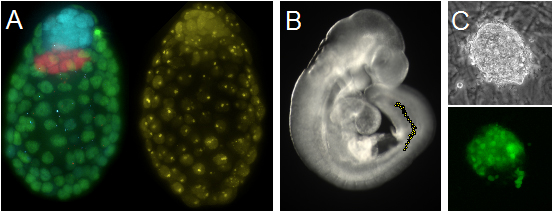Summary
Epigenetic mechanisms control cell type-specific interpretation of the genome sequence, which is largely identical between cells of different type and developmental potential. The inactivation of one of the two X-chromosomes in female mammals is a prominent example of such epigenetic regulation, in which gene expression from an entire X-chromosome is suppressed to avoid gene dosage imbalance with males, which only have a single X.
In our group (established in October 2014) we study the mechanisms of X-chromosome reactivation, which reverses X-inactivation and occurs in mouse pluripotent stem cells, early embryos and the germ cell lineage. We make use of complementary in vivo and in vitro approaches to identify and test the function of new regulators of this epigenetic reprogramming process. Our goal is to establish how the different steps (e.g. erasure of epigenetic marks, X-linked gene reactivation) are achieved and how they are linked to their biological context within pluripotent cells and in the germ line.
Research projects
- The role of PRDM14 during epigenetic reprogramming in the germ line
- X-chromosome reactivation during stem cell reprogramming
- Epigenetic reprogramming in the germ cell lineage in vitro
